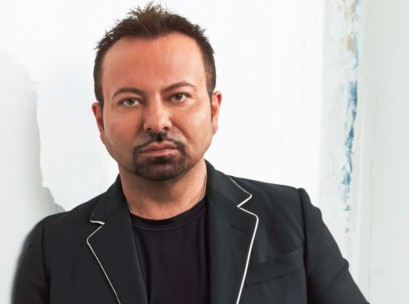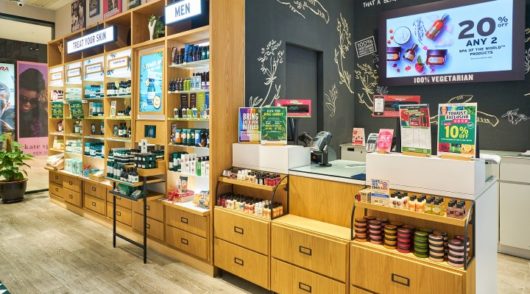 Napoleon Perdis first fell in love with make-up as a boy in Parramatta, watching his mother transform her face with the flick of a mascara wand. It was a love that stuck with him through an arts degree at Macquarie University, where he met his wife Soula-Marie, and afterwards, when he resisted going down the corporate career path. He wanted to be a make-up artist and started doing bridal make-up on the weekends.
Napoleon Perdis first fell in love with make-up as a boy in Parramatta, watching his mother transform her face with the flick of a mascara wand. It was a love that stuck with him through an arts degree at Macquarie University, where he met his wife Soula-Marie, and afterwards, when he resisted going down the corporate career path. He wanted to be a make-up artist and started doing bridal make-up on the weekends.
At that time in Australia, in the early 1990s, it was less socially accepted for men to be interested in make-up, and Perdis says he received a lot of hurtful comments over the years. But it didn’t dissuade him from opening his own make-up studio and creating his eponymous line of cosmetics. Together with his wife, Perdis opened the first Napoleon Perdis store in Paddington in 1995.
The brand grew through distribution deals with major department stores and hundreds of independent salons, and in 2006, Perdis and his wife moved to Los Angeles with their four daughters to conquer the US market. At one point, Napoleon Perdis products were available at 3,500 points of distribution across America and sales reached $35 million, but the rapid expansion was unsustainable, and Perdis pulled out of the US in 2015.
Today, Perdis is focused on restructuring the business based on lessons learned from retailing in the US. Last week, the make-up guru announced he would be shuttering some stores, pulling products out of David Jones and embarking on a new partnership with Priceline to ‘right-size’ the business. At the same time, he’s gearing up to reenter the US market next year, as well as Asia, the Middle East and potentially Europe.
Inside Retail Weekly: You recently announced the decision to end your 16-year partnership David Jones and shutter some of your own stores, as well as pull products from hundreds of independent retail stores and salons, as you embark on a new path with Priceline Pharmacy. Why are you making these significant changes?
Napoleon Perdis: First of all, ending that partnership with David Jones was extremely difficult. They’ve been a beautiful partner. However, having lived in the US for over 12 years, there are a number of things I’m starting to see that are affecting the Australian retail structure. One of those is that department stores are undergoing enormous restructuring. With the democratisation of buying through e-commerce, not just Amazon but every e-commerce player, the customer no longer has these segmented perceptions. When I was in America, I saw the struggles that department stores had, whereas Ulta was just pumping. The only retailer in Australia that could be an Ulta and have that democratisation was Priceline. So in order to network plan correctly, I closed David Jones. I didn’t need to be in both department stores, otherwise you’d be in a mall and have Napoleon Perdis available in eight different places. I also closed 20 of my own concept stores.
When I look at Priceline’s model, they are much more modern than Ulta was. Between health, wellness and beauty, one in three women are shopping at Priceline. They service customers democratically across the whole country – regional, city, surburban, greater suburban – and they’re allowing me to carve out my space in a total street-meets-prestige way. Napoleon Perdis has always been an embassy for where women can interpret their lifestyle as they want, no matter their demographic, culture, race, age, body shape…there’s no shame at Napoleon Perdis. I love that we’re anchoring that whole area for them, and I love that we’ll be available in places where the brand was not available before.
They’re also allowing me to develop products into new categories. We’re doing super-charged ingredients with snake serum and caviar and bamboo and plant extracts. We’re doing the largest primer bar and extending the line with the largest range of concealers. We have about 12 at the moment and we’re going to add about 30 new concealers, having one of the largest concealer bars in the Southern Hemisphere. And we’re adding mascaras as well.
Priceline is allowing me to create a journey for the customer in an open selling environment, where she’s totally in control, whereas the department store model has a lot of intervention. At the moment, we’re very keen to keep ourselves very consolidated and very much about the journey and relationship we have with the customer and open wall units.
IRW: Do you have any concerns that selling through Priceline, as opposed to a department store, will hurt your brand value?
NP: Not at all. In fact, it values it even more. Everyone said that being in Ulta would devalue their brand. Estee Lauder wouldn’t go in and Lancome wouldn’t go in, but now everyone is there. The value now is about giving the consumer choice. I serve people of different cultural backgrounds, people of colour and different body shapes. I don’t just serve fashionistas; I serve people that are wanting to empower themselves on a daily basis. It actually further adds to my brand DNA and the education journey that the wall units will provide.
IRW: There’s a lot of talk about ‘right sizing’ your bricks-and-mortar footprint in retail right now. What does this look like for your business, and how does e-commerce fit into these plans?
NP: The right size for Napoleon Perdis is going with makeup bars in malls where we don’t have other distribution. There may be opportunities in five to 10 new locations, but in all the main metropolises, we’re right-sized or can reduce footprint, so the customer knows she can get the full range at just one to two locations, rather than five to six. We’ve closed 20 of our own stores, we’re exiting David Jones and we’ve also narrowed our partner accounts. I have around 750 partner accounts and will be exiting 258 of those as well because a lot of them don’t keep up with our products and jeopardise our brand.
We’re building a new website that will be available in September and expanding other opportunities in e-commerce, not just with Priceline’s Sisterhood program, but with Adore Beauty and Princess Polly and a number of other e-commerce stores. We’re also working with Myer, which still has one of the largest databases and platforms in Australia with Myer One, so we’re making sure people can replenish wherever they’re most comfortable. The platform will be expanded even further with artificial intelligence to help our customer as she journeys through to find her solution.
Our e-commerce sales are now at around 3.5 per cent of the business and growing at 32 per cent like-for-like. Our aim is to grow e-commerce to 7.5 to 9 per cent of the total business. It’s also about working with new publishers. It’s not just Instagram, there’s Snapchat and Facebook Messenger and WhatsApp.
I want my social media to have the voice of Napoleon Perdis, the voice of my Greek, Italian, Arab consumers, equally as much as my Asian consumers, equally as much as my Sudanese and subcontinental Indian consumers. I want it to have the voice of the biggest, most beautiful women as well as the young fashionistas.
IRW: Beauty seems to be having a ‘moment’ right now. What do you think is driving it?
NP: There’s a reason beauty has always been at the front of every store..because it’s a great experience you can have to create an oasis. The only thing that’s changed is that it’s communicated online. Beauty is an art form that can give you quick inspiration and it’s affordable…it’ s not the secret of someone. I think that is where there’s a really unique opportunity. It’s also becoming more ethically correct. We don’t test on animals, we’re paraben-free and we’re moving to using totally recycled plastic and packaging. Those things are really important.
IRW: There’s been more of a focus on diversity in the beauty sector lately, with brands being called out for not offering products that suit a wide range of skin tones. Are you paying more attention to diversity?
NP: I’ve supported diversity from day one. I embraced the LGBTQI community long before the ‘vote yes’ campaign, but it’s not just about that. It’s also about body shape and embracing women for whoever they are…age, religion, culture, choice of fashion, choice of music. Diversity has always been at the core of my brand. It’s not new to me.
For me, diversity is something I encouraged from the beginning because I myself have been a victim of abuse in that area and I don’t want that across my network. I’ve been called everything under the sun. They’ve challenged my marriage, they’ve challenged my fatherhood and my manhood. Who says what a modern man is? Who is that? I feel equal to every other man in Australia. Because I’m Greek background, you know, the story has been, the wog boy made good. I’m an Australian made good. I was born and bred here.
The one thing I will say is that no matter who you are, if you don’t achieve the company’s objectives in all areas, you’re not going to survive. I’m equally as strong a business leader, making sure we embrace the values of modern businesses and modern behaviour. It’s not acceptable to not be protecting and looking after the customer, or protecting the company values in that way.
IRW: Your daughter Lianna is heavily involved in the business. What kind of fresh insights does she bring to the table?
NP: Lianna has got nine covers now on Grazia, Girlfriend, Harper’s Bazaar…she brings that sense of aspiration that you can walk the runway and still bring value to a family business. She’ll be taking her gap year in Australia following the European summer to spend time in stores and understand the customer. My other daughters are now 16.5 years old and they’ve started to get involved as well. You’ll see them involved with the Priceline consumer launch.
They all bring enormous insights. For example, they said, ‘Dad, stop trying to add two new colours to a collection at a time and just do a drop and get everything out.’ Gen Z love drops. They said we should do more out-there colours because it draws people in. We did that during Christmas with our lip gloss pack and our Auto Pilot primer and it really worked. And they said to stop re-ordering product. Once it sells it, it’s sold out,. So now we have the ability to keep our originals and just drop in and out with new things, rather than feel like we need to carry them forever.
Those sorts of insights are priceless, you can’t pay an ad creative to do that for you. We just sit around the dinner table and talk about these things. On that note, my wife Soula Marie is 48 years old and says, ‘Don’t forget about us 40 and 50-year-old women. Don’t put anyone on the shelf.’
IRW: It was reported last September that you were looking for investors to fund an entry into Asia and re-entry into the US in 2018. Can you update us on these plans?
NP: We are 70 per cent of the way with that process of receiving investment and will be ready at the end of 2018, early 2019 to enter three new markets. We’re going to be reentering the USA through distribution, as well as Asia and the Middle East through distribution. And we’re in talks with two European retailers, but that’s still at the initial stages.
IRW: After first entering the US in 2006, you pulled out of that market in 2015. What happened there?
NP: What happened was I was funding my own warehouse and a centre in every city in America, which was like its own country. We were in Houston, Philadelphia, New York, Dallas, Miami, Fort Lauderdale, Milwaukee, Atlanta…we ran out of money. The total volume we were doing in America was close to $30 million, and at one point, we had 3,500 points of distribution across the US. We had enormous successes, but the profit was being chewed up with expansion, so we came back to our home turf to rightsize our network here and reinvest here. Next time, we’ll go back with distributors that actually have the muscle to do things correctly and know the networks, which on our own was taking a lot of time and money.
The other thing is, I didn’t want the children being brought up in America anymore. We are Australians of Greek heritage, and I wanted to get back to those European and Australian values. We went back to our roots to live in Athens to reinstate those values.
IRW: In the past, you experimented with selling homewares and apparel through your Life.Style concept. Tell us a bit about this experience and why it ultimately didn’t work out?
NP: It was working out just fine, but it was an experiment I didn’t have time for. If you look at Fred Segal and Colette and Jeffrey New York, you can see the concept works, but it needed more space and investment. There was only one of me, and I didn’t have time to go around the world shopping and curating. In time, I will revisit it because I still believe the formula was fabulous. It wasn’t an experiment that failed, it was an experiment that needed more time and more energy. I would go back to it in a heartbeat, but I would need a partner.
IRW: After 25 years in business, how do you maintain this drive to keep trying new concepts?
NP: I don’t rest; I don’t sleep; I like to talk to everyone. I love hearing from everyone from the housekeeper to the gardner to the CEO to the fashionista to the major fashion editor of a magazine. And I absolutely love retailing. I love how dynamic, entrepreneurial and people-friendly it is. I couldn’t be more in heaven than being around people.
I have an opinion and I share it. There are those that love my vision and those that don’t, but there’s enough of the world around for everyone to have space. You’ve got to love getting out there and learning and selling and working it.





